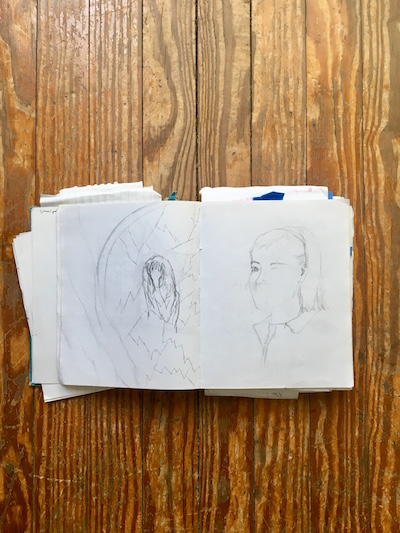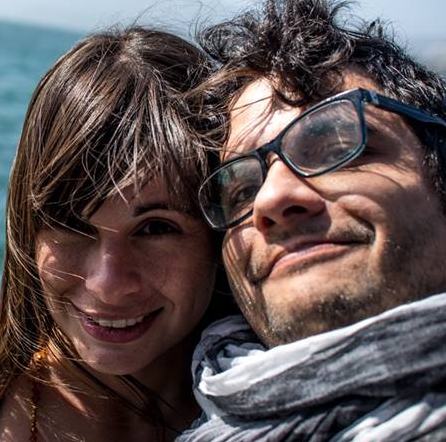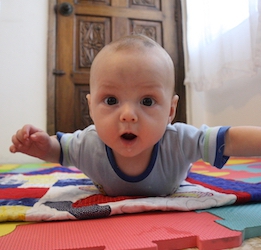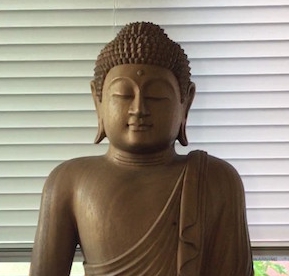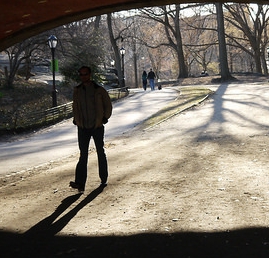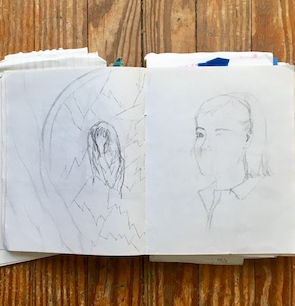I could tell everyone wanted it to be over and done with.
Mom sat next to me, her nose running as she wept. Dad, on the other side of me, bent to hold his head with both hands, his eyes directed at the floor.
“Martin, what do you think?” Mom kept asking through wet snivels. Dad remained folded, and mute.
The three of us sat on the couch in the front living room. Scott and Tonya Lewis’ home was comfortably and abundantly furnished, with the exception of their front parlor. Everything from the carpet to the drapery was muted and colorless. Unlike at my family’s home in Colorado, and despite their four children, no toys or magazines littered the floor. No day-old coffee mugs perched on the edges of furniture.
Scott and Tonya sat in armchairs across from us, and I picked at an imperfection in the white leather while the adults spoke. The couch was painted, I realized, as flakes of white came off in my fingernails. My thighs clung to the tacky surface when I tried to move, so I did my best to stay still. I couldn’t make eye contact with anyone. There were voices, but all I could hear was the whir of the ceiling fan, the buzz of a neighbor mowing their lawn.
On the phone a few weeks before, Mom made it sound like she and Dad were finally coming to North Dakota to retrieve me and the girls. I could imagine her in bed on the other end of the line, curled into a ball, sniffing into wads of toilet paper.
“Meg, when you and your sisters come back to Colorado, you’ll be in a new high school. I think Dad already told you we had to move, so it’ll be a different district than before, but we found another house to rent . . . I think you can take guitar lessons at the new school if you want.”
She continued telling me about the changes coming, and I allowed myself to feel a moment of release, to fantasize about the end of the summer. I imagined sleeping in my own bed and petting our dogs again for the first time. This would be the third move in a year, and my sisters and I had adjusted to the rhythm of change. The only thing any of us really missed was living somewhere we could be ourselves: siblings who fought and shared clothes and occasionally rebelled as a collective. Three of the four of us were teenagers, who until recently had had friends and the illusion of independence. Our home life before hadn’t been perfect, but it was familiar and safe, and despite financial hardship, our parents had done their best at providing a normal American childhood.
With the Lewises, in contrast, piety had woven its way out of church and into everything from the way we were allowed to eat to the time of day we washed our faces. At the start of the summer, Tonya insisted on taking all four of us to the mall for new clothes. “We can’t have you girls running around in stuff like that,” she said, “not around our boys.” She cast a frown in the direction of my tank top.
“I’m sorry it hasn’t been the summer camp experience Scott and Tonya promised,” Mom said, her voice raspy and weak on the line. “I promise things will get better, Meg. At the end of the summer, you’ll have a chance for a better life, a fresh start.” She paused, struggling to breathe. “That’s all we want for you girls, Meg, a better life."
In May, when Scott and Tonya came to Colorado to pick us up, that had been the tone of their spiel, too. My parents had met the Lewises as newlywed Christians back in the mid-1980s, back before any of us were born, and they’d stayed loosely in touch over the years.
“Your Mom and Dad have a few things to work out,” Tonya said, standing in my bedroom doorway, holding her chubby hands awkwardly in front of her. Her khakis and salmon button-up were more formal and out of place, and her hair was overdone and puffy with hairspray. My mom had always been more of a denim and T-shirt woman, whose short brown hair blew wild with the breeze. “We’re going to have summer camp together at our house. The kids are excited to meet all of you.”
Sure, I thought sarcastically, shoving T-shirts and pajamas into a duffel bag. Because you and Scott scream “summer camp” in your matching shirts from Land’s End.
Instead of creative time outside or campfires in the evening, the summer had been a slow, agonizing slew of days spent listlessly watching Veggie Tales in the basement, making beaded friendship bracelets with no one but the younger Lewis kids to gift them to. It could have been better if they were normal teenagers, with friends or hobbies or even a little bit of adolescent spunk. But all four of them were homeschooled, and the only thing Tonya allowed them to do for fun was go to youth group at church on Wednesday evenings.
Their oldest, at 19, was the untouchable exception. She was their only biological child, a “miracle baby” after years of infertility. I imagined that because of that, she was the only one brave enough to rebel in any meaningful way. She had long, silky blonde hair, and a mean streak that kept everyone around her in check. She worked at Victoria’s Secret and had a boyfriend she spent most of her time with, out of the house. She also had a refrigerator in the garage that Tonya stocked with yogurt and cheese and Fig Newtons specifically for her. When Liz wasn’t working or with her boyfriend, she exercised for hours at a time at the YMCA – a building none of us ever saw. “Exercise is Liz’s thing,” Tonya would say if one of us asked to join.
The three younger Lewis kids had all been adopted and were on meds for everything from ADHD to food allergies. The boys, 15 and 12, were related to each other via their biological mother, and the youngest girl, who was 14, was sweet and quiet and seemed relieved to have new company. Tonya homeschooled them the same way she’d homeschooled Liz: in paper workbooks as much as possible because she didn’t trust the Internet. “There are sinful temptations on every site,” she’d scold if one of the kids asked to look something up. My sisters and I weren’t even allowed to check our email, unless Tonya was in the room, standing over our shoulder.
The Lewises’ house was a Cape Cod style that sat at the end of a cul-de-sac in what seemed like an expensive neighborhood. We couldn’t be sure, though, because we never really saw much of the town around us. Scott and Tonya’s younger kids lived in an orbit between church, required ballet lessons, and Bible study, so naturally we were stuck in the same pattern. At 14, I knew I was too old to sit around all day watching cartoons meant for elementary school kids, but it didn’t matter because Scott and Tonya believed the outside world was obscene and morally corrupt. Therefore, hours in front of the TV on mid-summer afternoons were completely acceptable.
The summer wore on my sisters and me in different ways. Maddie, the oldest, was lucky enough to have a job, so she took as many lifeguarding shifts as she could at the local water park. In the evenings, Maddie would make spaghetti and disappear to her bed with the pot of noodles. Occasionally, she’d invite me and the other girls to sneak up to her room, and we’d sit on her bed while she folded her laundry and organized her secret stash of CDs. The four of us would sit in the dark, whispering sharply about why the summer was so screwed up. The rest of her free time was spent sleeping or locked in her room on the phone. She’d graduated from high school in May and didn’t have any plans to go to college, though even if she did, Mom and Dad wouldn’t be able to afford it.
Molly, the youngest, responded to things a lot like I had. We were both the guilty type, so instead of resisting when Scott and Tonya told us to do our devotionals or volunteer to lead a prayer at youth group, we just did it. I had never thought of myself as an extraordinarily bad kid, and I could take the occasional misaligned scolding, but I was getting sick of repenting to Tonya every time I accidentally said “Oh my God.” In defiance, I ranted in my journal.
Melody, my fellow middle kid, had a rebellious streak; a light inside of her flared in dangerous spits and bursts. A few weeks before our parents arrived, in a fit of boredom, she’d snuck out at midnight with toilet paper and other vandalizing supplies. Under the glare of a street lamp, I’d watched her carefully smudge handfuls of chunky peanut butter all over the neighbor’s Jeep. I had been proud of her in the moment. And then I was terrified for her when I remembered Mom and Dad had given full parental authority to Scott and Tonya while we were living with them; they subscribed to biblical corporal punishment. A month later, when Mom and Dad finally came, Melody’s backside was still recovering from the leather lashing it had received. “A Godly consequence,” Scott had explained, making an example of my younger sister as everyone in the house stood soberly in the foyer, watching.
Sitting on the couch, sandwiched between my parents, the months my sisters and I had just endured felt distant somehow. The room was freezing and stifling at the same time. Scott and Tonya were wearing those stupid salmon-colored shirts again. I looked up, noticing my mother had started to whimper at something Scott said while Tonya stood, awkwardly reaching to rub her back. Dad still had his eyes directed at the floor.
“Marna, we . . . well, we just think this would be better for Meghan. We have her best interest in mind, you know.”
I watched my mother nod, and through her weeping, I heard her murmur, “I know you do, Scott, I know.”
“And of all the girls, she just gets along so nicely with the other kids,” Tonya said, making eye contact with her husband.
My nail plunged beyond the leather into the plush of the couch. Dad remained unmoving. Tonya glanced at Scott as more tears slid down my mother’s cheeks. I noticed the papers in Tonya’s hand for the first time.
“Meghan,” Tonya said, looking at me.
Meeting her gaze, I longed for my sisters in the other room. I wished they were next to me, one of them at least. Even Maddie, who would probably just rat me out for picking at the couch, but God, I wished she were here.
“Yeah,” I said.
“Meghan, Scott and I want you to stay here, with us. We want to homeschool you with the kids until you finish high school.”
It then occurred to me that the stack of papers she was holding were custody documents. I tore my eyes from her, training my eyes on the spot I’d punctured. My limbs were numb and I was lost in a blizzard of terror. I wanted to respond, to say no, to ask why, but my lips wouldn’t move. Everything was a wash of white.
Mom and Dad took me to their hotel room for one last evening together, just the three of us. It reminded me of when I was younger, and Dad would occasionally take one of us girls to work with him for a parent-daughter workday. Those had been special days filled with stops for Doritos and Mr. Pibb at the gas station, and treats from his co-workers. The four of us particularly admired Fireball Dave, a man who kept an industrial-size bucket of Atomic Fireballs at his desk. You knew it had been a good day if, by five o’clock, your tongue was red, numb, and unable to sense anything but cinnamon spice.
With Mom, there had been subtler moments of one-on-one time: getting ice cream on the long drive home from back-to-school shopping; deciding to stop at the dollar theater at the end of a day of errand-running.
Now that I was older, and the memorable solo days had dwindled, it was awkward being alone with them in this hotel room, awkward having all of their attention when I had come to know my existence as one of four. For so long at home, I had just been one of “the girls.” They’d started referring to us as a collective years ago: “The girls want dinner.” “The girls need money.” “The girls are driving me crazy.”
I sat on the bed with Mom. She’d lost a lot of weight since I last saw her at the beginning of the summer. Her face was sallow, and her eyes were mute despite the words coming from her mouth.
“Meghan, your Dad and I . . . Your Dad and I just don’t know what we’re doing . . . all the moving before, when he lost his job and we had to go to Colo-.” She choked her way through the rest of “Colorado.”
It was maddening that she couldn’t make it through a full sentence. I ached for Dad to jump in on the conversation, say anything. He sat on a wobbly metal chair in the corner of the room. His blonde hair was thinning on top, and the slightest gray was creeping into the bottom of his sideburns. He hadn’t muttered a word since earlier with the Lewises, though he no longer hung his head between his knees. Now he just stared into his lap where his hands rested, fingers interlaced.
“And then not knowing what to do now,” Mom continued, reaching across the hotel bed for my hand. “We don’t want to keep pulling you in and out of all the schools. And the other girls . . . it’s just so much easier because they’re younger and Maddie is going to try to start college. We just want you to have some consistency, at the very least. And Tonya says you get along so well with the other kids.”
She shuddered and wiped her nose, more thin tears sliding down her cheeks. I stared at her, my throat swollen with all the things I wanted to say, all the questions I wanted to ask. Why me? Why here? Why them?
Part of me wanted to comfort her, to tell her it would be alright, that I knew she was just trying to take care of me. But another part of me wanted to beg my mother to snap out of it, to see me, to hold me close as a part of her. How does one ask their mother not to leave? How does one ask to be shown protective, maternal love? Sitting next to her, feeling her body shake, I realized it had been years – well before puberty and high school and the hell of moving – since my mother had soothed me.
“We love you Meghan, honey . . . just think, this way you’ll be able to take ballet, and you’ll be doing school at home now, so you don’t have to adjust to a whole new high school again.” She trailed off, saying something about church.
I couldn’t respond. I couldn’t reassure my mother that I would be fine and that this would be OK, so I distracted myself by studying the pattern of the hotel comforter.
She reached over and tucked a lock of hair behind my ear.
I turned to look at the blank television screen.
The next day, I didn’t cry while I watched Dad pack up the car to leave. The four of us girls hovered around one another, holding hands and hugging. Standing close to each other helped us feel safe, even if just for the next 10 minutes. Mom sat in the front seat of the car, sunglasses covering her puffy eyes, and her legs hung limply out of the open door. Scott puttered in the front yard, trying to help Dad, while Tonya stayed inside. I imagined she was making sure the other kids were making progress on the Wednesday section of their workbooks.
When all the duffel bags and stuffed animals were in place, everyone knew it was time. My sisters and I turned, folding in, all of us facing each other in a tight bud.
“I’ll be OK guys, I swear,” I whispered. I could say to them what I couldn’t communicate to my parents. I could feel sobs dancing in the back of my throat. Molly started crying and Maddie held me tighter. Melody whispered “Fuck them” under her breath. We lingered, the four of us swaying. This was who we were. This was all we needed.
Mom called out meekly, “Meg, come give me a hug.” I squeezed the girls and broke the circle to say goodbye to my parents. Mom wept and hugged me gently, Dad still couldn’t look me in the eyes. After everyone piled into the car, Dad unceremoniously buckled his seatbelt, gave me a final nod, and started pulling out of the driveway.
I felt an urge to run, to claw at the car, to break the glass and climb inside. Mom covered her face, and the girls fought to stay in view. I studied their faces while they pressed their foreheads to the glass of the rear window. Even if they didn’t know exactly what it would be like for me to stay with the Lewises by myself, they could guess.
After a short and quiet evening with my new family, I was left alone in my room on the ground floor, a full story of house between me and everyone else. Until then, Molly and Melody had slept in the bedroom across the hallway from mine. I’d spent evenings cradling one or both of them, murmuring gossip about the Lewises from the safety of the half basement. “It’ll be over soon,” I had whispered to Melody just a week before, petting her hair and cradling her in my arms following her punishment for the peanut butter.
The three of us had shared the bathroom attached to their bedroom. The bathroom where Molly, sick with the stomach flu in the middle of June, hysterically begged me not tell Tonya so she could still go to sleep-away Bible camp. “I need a break, I need to go, I can’t stand it here,” my nine year old sister had sobbed, pale and shaking with fever.
But now, in my room decorated by Tonya, in the empty basement filled with the ghosts of my sisters, I cried. My tears soaked the trendy floral sheets, the mustard-yellow comforter, and the decorative pillows with Psalm verses stitched into them. For the first time I let myself wail, knowing nobody would hear me. I was the only one left in the basement of the house.
Meghan Eberly is a writer, baker, and entrepreneur based in Savannah, Georgia. She completed her Master’s coursework in media anthropology at Harvard University and received a B.A. from Sarah Lawrence College, where she first worked on a draft of this piece almost a decade ago. Recently, after many years spent hustling as a writer and editor, Meghan set aside her laptop to work as a professional baker. She and her husband are in the process of opening a tech-free bakery and bar in Savannah called Analog Public House, whose mission is to help people step away from their devices and make meaningful community by dwelling offline.
